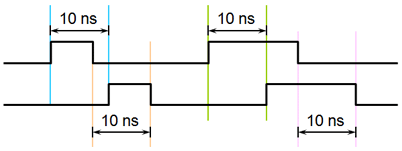Adding delay to nonblocking assignments is done as follows:
always @(*) aUsing nonblocking assignment with delay in this manner is a way of implementing transport delay , as shown below:
Blocking versus Nonblocking Assignment
Nonblocking statements allow you to schedule assignments without blocking the procedural flow. You can use the nonblocking procedural statement whenever you want to make several register assignments within the same time step without regard to order or dependence upon each other. It means that nonblocking statements resemble actual hardware more than blocking assignments.
Generally you would use nonblocking assignment whenever assigning to variables that are shared between multiple initial or always processes if the statements that access the variable could execute at the same time. Doing so resolves race conditions.
Blocking assignment is used to assign to temporary variables when breaking up large calculations into multiple assignment statements. For example:
always @(posedge clk) begin t1 = b + c; t2 = d + e; aProcedural Continuous Assignment
Two types of continuous assignment are available in initial and always processes: assign and force.
The target of an assign statement must be a register or a concatenation of registers. The value is continuously driven onto its target and that value takes priority over values assigned in procedural assignments. Once a value is assigned with an assign statement, it can only be changed with another assign statement or with a force statement. Execution of deassign releases the continuous assignment, meaning that the value of the register can once again be changed with procedural assignments. For example, the following implements a D-type flip-flop with set and reset:
module dff(q, qb, c, d, r, s); output q, qb; input c, d, r, s; reg q; assign qb = ~q; always @(posedge c) qAssign statements are used to implement set and reset because they dominate over the non-blocking assignment used to update q upon positive edges of the clock c. If instead a simple procedural assignment were used instead, then a positive edge on the clock could change q even if r or s were high.
A force statement is similar to assign, except that it can be applied to both registers and nets. It overrides all other assignments until the release statement is executed. Force is often used in testbenches to eliminate initial x-values in the DUT or to place it in a particular state. For example:
module dff_tb; reg c = 0, d = 1, r = 0, s = 0; wire q, qb; dff FF1 (q, qb, c, d, r, s); initial begin #1 force FF1.q = 0; #1 release FF1.q; #1 c = 1; #1 $strobe(q ? "pass" : "FAIL"); $finish; end endmodule© Copyright 2015-2023, Designer's Guide Consulting, Inc.. Last updated on Sep 05, 2024.

